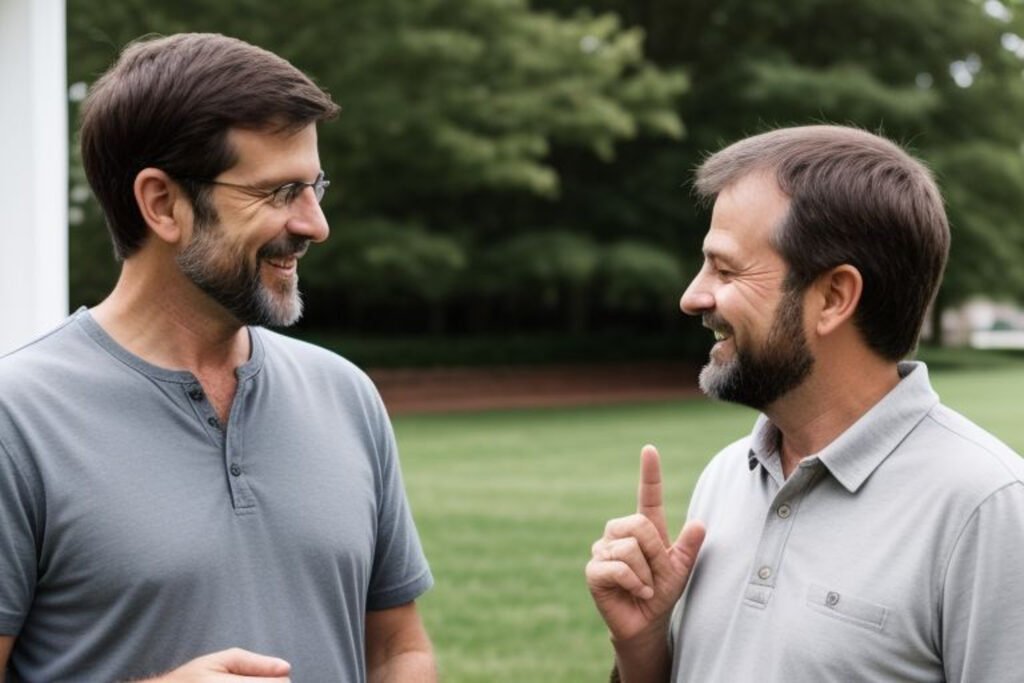One of our greatest challenges as believers in God is sharing our faith without sounding preachy or condescending. Growing up Jewish, this was not an issue because Jews are not commanded to share their faith with non-believers. However, having accepted Jesus, I am now instructed to share my faith in the hope that others might also see the light.
The Apostle John addressed this issue two thousand years ago. In 1 John 1:1-5 he wrote:
That which was from the beginning, which we have heard, which we have seen with our eyes, which we looked upon and have touched with our hands, concerning the word of life—the life was made manifest, and we have seen it, and testify to it and proclaim to you the eternal life, which was with the Father and was made manifest to us—that which we have seen and heard we proclaim also to you, so that you too may have fellowship with us; and indeed our fellowship is with the Father and with his Son Jesus Christ. And we are writing these things so that our joy may be complete.
God Opened John\’s Eyes
John was not an educated man. He was a fisherman who worked with his brother and father. He did not discover God by spending hours in prayer and meditation at a monastery. He did not discover God at all. God picked him. Matthew 4:21-22 (ESV) states,
And going on from there he saw two other brothers, James the son of Zebedee and John his brother, in the boat with Zebedee their father, mending their nets, and he called them. Immediately they left the boat and their father and followed him.
My guess is that John was not the kind of man who would walk into a crowd and start preaching or teaching. Yet, after his experience walking with Jesus, he was called to share what he had seen and heard. Why? “So that you too may have fellowship with us…” But, not just fellowship. Fellowship for a very important reason. John continues, “…and indeed our fellowship is with the Father and with his Son Jesus Christ. And we are writing these things so that our joy may be complete.”
God Opened Our Eyes
Now, none of us have had John’s incredible experience of living side-by-side with God for three years. However, thanks to the power of the Holy Spirit, we, as believers, have felt God’s presence in the deepest recesses of our hearts and minds. In fact, Jesus declared that our awareness of Him, without seeing Him in the flesh, is just as relevant as John’s in-person experience. Jesus told Thomas in John 20:29, “Have you believed because you have seen me? Blessed are those who have not seen and yet have believed.”
According to Jesus, our experience of God is powerful and true, just like John’s experience of God. And like John, we have been called to spread the word about the fact that God came down to Earth in the form of a man named Jesus. Matthew 28:18-20 states:
And Jesus came and said to them, \”All authority in heaven and on earth has been given to me. Go therefore and make disciples of all nations, baptizing them in the name of the Father and of the Son and of the Holy Spirit, teaching them to observe all that I have commanded you. And behold, I am with you always, to the end of the age.
We are meant to share what we have experienced in our hearts with others so that they may have fellowship with the Father, Son, and Holy Spirit. Then, and only then, will our joy be complete.
Sharing Our Faith Is Not Easy
However, sharing our faith is not easy. I\’ve found it challenging to convey my religious experience with non-believers. One reason is that so many people have negative views about religion, having grown up in unhappy religious families or dysfunctional churches. God is not dysfunctional, but people certainly are. And that\’s a huge turn-off. Another reason is that we\’ve all been raised in a hyper-secular culture that looks down on faith as simple-minded and ignorant. As a result of these and other reasons, non-believers are frequently turned off by invitations to embrace God.
Regarding my parents and siblings, sharing my faith seems impossible. My turning to Jesus has traumatized them. They are secular Jews who believe in the values of social justice, reason, and self-regulated mortality. They are shocked that I believe in the Bible\’s description of God. And they are dismayed that I\’ve come to recognize Jesus as the Messiah. They are deeply saddened by the fact that, in their minds, I have lost my sense of reason and have turned my back on my Jewish roots. Of course, I don\’t see it that way. Jesus\’ disciples were all Jewish. It is a gift that my eyes have been open to the truth about God, Jesus, and the Holy Spirit. But due to this conflict in beliefs, all conversations about faith are frowned upon, so we avoid the topic.
The Minds of Unbelievers
Why are most nonbelievers so opposed to considering the possibility that the God of the Bible exists? Paul addressed this question in Corinthians 4:4 when he said, \”The god of this world has blinded the minds of the unbelievers, to keep them from seeing the light of the gospel of the glory of Christ, who is the image of God.\”
In other words, Satan has blinded them so they cannot see. How has he accomplished this? First, he has used the power of reason and secular thinking to make religion seem old-fashioned, shallow, and narrow-minded. Second, he has corrupted the minds of Christian men and women to foment conflict within churches. Nearly every church denomination in the past twenty years has been torn asunder over conflicts regarding sexual morality. The Presbyterian church has split into liberal Presbyterian USA and conservative Presbyterian PCA church. The Episcopal church split, creating the more conservative Anglican American church. And the Methodists have recently spawned the conservative Methodist Global church. I am convinced that these splits are the work of the evil one himself. How in the world can we, as believers, communicate the important truths about God when the entire structure of the Christian church seems to be falling apart?
Sharing Our Faith Against All Odds
The answer is that there is no way we can communicate these truths from a worldly perspective. But, fortunately, we are not of this world. Our faith in God gives us supernatural abilities – not through our own strength – but through the strength of the Holy Spirit. The world will always give us trouble. And that includes giving us trouble when sharing our faith. But happily, Jesus encouraged us in these moments when he said in John 16:33:
\”I have told you these things, so that in me you may have peace. In this world you will have trouble. But take heart! I have overcome the world\”
No matter our circumstances, the state of the world, or the condition of American churches, we can still share our faith with friends, strangers, and even family. But to be successful, we need to follow certain guidelines. Let\’s review them now.
Lead with Humility and Love
To begin, sharing the truth of Jesus with non-believers requires humility, love, and sensitivity. It’s essential to approach these conversations as opportunities to plant seeds, trusting the Holy Spirit to do the transformative work when the time is right.
In addition, we must remember that actions speak louder than words. We should strive to demonstrate God’s love through kindness, patience, and service. When people see the difference Jesus makes in our lives – our peace, joy, and compassion – they may become curious about our faith. As St. Francis of Assisi is credited with saying, “Preach the Gospel at all times; use words only if necessary.”
That said, we will inevitably be humbled when we see that our actions often fall short of demonstrating kindness and patience. That’s not a bad thing. Adopting a humble attitude is essential to effectively share the Gospel. Our shortcomings prove that we need help just as much as they do.
Ask Questions and Then Listen
Rather than starting a conversation about faith with a proclamation, we should begin by asking questions about their beliefs, values, and life experiences. Then, we must show genuine interest in what they share and try our best to understand their perspective. This behavior builds trust and also enables us to identify areas where they may be searching for meaning, healing, or hope.
For example, we might ask:
“Do you feel content and at peace in your life?”
“Have you ever wondered if there’s more to life than what we can see or touch?”
Sharing Our Personal Story
Our testimony is one of the most powerful tools we have. We should strive to share how Jesus has transformed our lives in a relatable and honest way. This includes sharing personal struggles, how we found hope in Christ, and the beneficial changes we’ve experienced. People can argue with theological concepts, but they can’t deny the reality of a personal experience.
As we share our stories, we need to avoid jargon or overly religious language that might alienate non-believers. Instead of saying that we’re “truly blessed,” we can use language they can relate to. Accepting Jesus has given us “inner peace” and a sense of “purpose.” We should speak in a conversational tone rather than a preachy one and avoid making them feel judged or pressured.
Point to Jesus, Not Ourselves
The goal is not to win an argument but to point them to Christ. When sharing our faith, we should focus on Jesus’ character – his love, grace, and sacrifice – rather than trying to prove them wrong. We can let the beauty of who Jesus is speak for itself.
A good story to reveal Jesus’ character is when teachers of the law brought a woman to him who had been caught in the act of adultery. They said, \”Teacher, this woman was caught in the act of adultery. The Law of Moses commands us to stone such women. Now, what do you say?\” They were trying to trap Jesus into either contradicting Jewish law or appearing harsh and merciless.
Instead of answering immediately, Jesus stooped down and began writing on the ground with his finger. When they continued to press him, he stood and said, \”Let any one of you who is without sin be the first to throw a stone at her.\” One by one, the accusers walked away, beginning with the oldest, until only Jesus and the woman were left.
Jesus then asked her, \”Woman, where are they? Has no one condemned you?\”
She replied, \”No one, sir.\”
And Jesus said, \”Then neither do I condemn you. Go now and leave your life of sin.\”
This story shows how Jesus demonstrated compassion instead of judgment, embodying a deeply human response to a moment of vulnerability. His response cleverly disarmed those seeking to trap Him while exposing their own hypocrisy. This moment of humility and compassion will resonate with most people. Jesus offered forgiveness without condoning the wrongdoing, emphasizing mercy over punishment. The story deals with themes of judgment, forgiveness, and moral introspection that transcend religious boundaries.
Be Patient and Pray
Turning to God is ultimately the work of the Holy Spirit, not us. We can pray for non-believers, asking God to soften their hearts and open their minds. Then we should step back, trust God’s timing, and be patient, knowing that the seeds we plant may bear fruit later. Sometimes, a person may not be ready to engage in spiritual conversations, and that’s okay. We must be mindful to respect their boundaries and trust that God will continue working in their life. Simply being a consistent, loving presence can make a lasting impression.
We must pray that our lives will reflect the truth of the Gospel. If others see the peace and purpose we have in Christ, it may open doors for conversations. As Jesus said,
“Let your light shine before others, that they may see your good deeds and glorify your Father in heaven” (Matthew 5:16).
Instead of saying, “You need to believe in Jesus or you’ll never find peace,” we ought to say something like:
“I used to struggle a lot with [insert struggle], but when I started to learn more about Jesus and His love for me, it really changed my perspective. I’d love to share more if you’re interested.”
By approaching non-believers with love, humility, and respect, we can create an environment where they feel safe to explore faith. Remember, our role is to share the truth with gentleness and grace, trusting God to do the rest. That is the essence of sharing our faith.
Don\’t Panic!
When sharing our faith, it is helpful to remember the sage advice of Douglas Adams in his classic novel, The Hitchhiker\’s Guide to the Galaxy – Don\’t Panic! We must always remember that the Holy Spirit is in charge, not us. In fact, the very words that come out of our mouths regarding God and faith are directed by the Holy Spirit. We are simply the mouthpiece, not the source. Don\’t overthink what you will say. Trust that the right words will come.
The most important thing to remember is that sharing our faith is a command from God. We don\’t need to mull over whether it\’s a good idea or not. So let\’s get down on our knees and pray to the Lord to give us the strength to start sharing the good news of the Gospel. Then let\’s head out the door and watch how the Lord works miracles in the desert!
About Raleigh Acupuncture
At Raleigh Acupuncture Associates, we are committed to providing exceptional Chinese medicine treatments grounded in the core Judeo-Christian principles of love, faith, kindness, and truth. Our faith informs our approach to care, guiding us to treat every patient with compassion and respect. We believe deeply in inclusivity and welcome people from all walks of life, regardless of their faith, belief system, or cultural background. In our clinic, everyone is valued, embraced, and supported, ensuring a safe and nurturing environment where all individuals can experience healing and wellness.
BOOK NOW to schedule an appointment online.
Meet the Practitioners (Video).
Learn about all the conditions we treat.
Focus Keyphrase: Sharing Our Faith
Image generated with https://perchance.org/ai-text-to-image-generator










